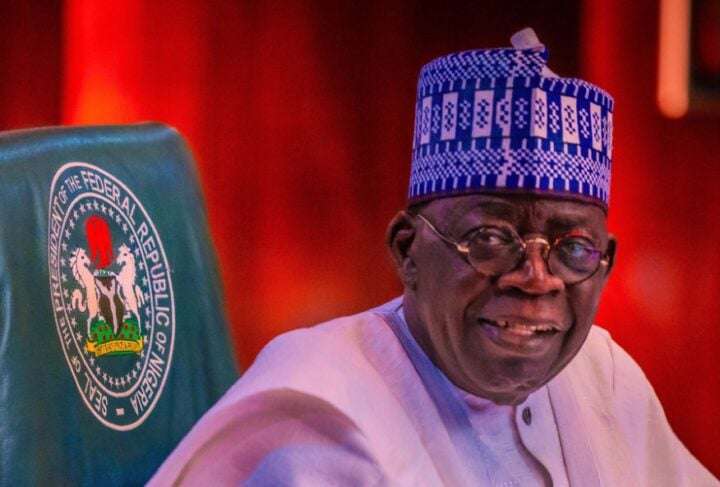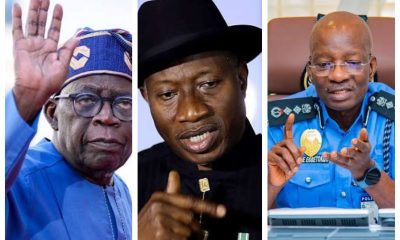Politics
2024: President Tinubu plots Edo take over

The off cycle governorship election in Edo State, billed for September 21, is already a heated contest, as political heavyweights in the three prominent political parties; the Peoples Democratic Party (PDP), the All Progressives Congress (APC) and Labour Party (LP) embark on last minute push to emerge candidates in the primaries billed for February, in the hope of ultimately securing the people’s mandate.
But there’s the President Bola Tunubu factor, and the former Lagos State governor, with possible axe to grind, has vowed to take the state, an indication that beyond campaigning for votes, political parties ought to also prepare for a real battle on election day.
“You know me well, and you know Adams Oshiomhole well. We’re still going to fight further. Don’t worry, we’re with you, you will not work alone,” Tinubu told enthusiastic party leaders from Edo in Aso Rock recently.
The people of Edo State surely know President Tunubu well. With a reputation for ‘grabbing, snatching and running’ in elections, there’s much for the people to worry about. The APC, Tinubu’s party and the country’s ruling party since 2015, though not necessarily popular in Edo, had held the state since its formation in 2013, when the then Action Congress of Nigeria (ACN) governor, Adams Oshiomhole, naturally collapsed into the emergent platform, which was primarily a merger of ACN led by Tinubu and the Congress for Progressive Change (CPC) led by Tinubu’s predecessor, Muhammadu Buhari, till 2020.
In the 2016 governorship election, which came a year after the APC had secured power at the centre, Oshiomhole, the then incumbent governor, deployed strong arm tactic to keep the state, with Godwin Obaseki, the present outgoing incumbent governor, who had served as head of his economic team, being declared winner of the poll widely believed to have been truly won by Pastor Osagie Ize-Iyamu, then candidate of the PDP.
By 2020, however, when Obaseki was due for another election, the roles had spectacularly reversed. Disgruntled party leaders, who accused Obaseki of favouring technocrats, conveniently dismissed as “outsiders” or “Lagos Boys” in the award of contracts at the expense of those, who worked for his victory, rose up in arms to ensure he was denied another term of office, and who best to recruit to accomplish the objective than the very man who had in many people’s reckoning, actually won the election of 2016, Pastor Ize-Iyamu.
Thus, with Oshiomhole and other party leaders determined to deny Obaseki another term, he was denied APC ticket in favour of his 2016 opponent, which caused him to defect to the PDP, where he was welcomed and given the ticket. The APC had lost Edo for the first time. And in the election, it was for the vast majority of Edo people, a question of standing up to god-fatherism; be it in the shape of Oshiomhole, or Tinubu, who was believed to be the real power broker behind the push to oust Obaseki.
The former Lagos governor had weeks before the election, released a video describing himself as the father of all democrats, while asking Edo people to vote out Obaseki. The video was predictably counterproductive. It gave added impetus to the people’s determination to ensure that Tinubu doesn’t extend his reach to the state, hence the catchphrase “Edo no be Lagos,” became the rallying cry of the Edo masses. And with then President Buhari opting not to deploy federal might on the state, Obaseki easily secured his second term.
Obaseki had crushed two god-fathers, and the people had sent a strong message to Tunubu. But four years is a long time in politics. Today, the Lagos godfather is president of, as he likes to emphasize, ‘the Federal Republic of Nigeria,’ with the entire state power architecture at his disposal, and he has vowed to use his powers to ‘bring Edo back’ to APC.
“One thing I can assure you,” he told Edo APC leaders amid cheers at the recent meeting, “Is, yes, do you want the Edo back? I am the president of the Federal Republic of Nigeria. I will bring Edo back to you.”
A source close to the president, who craved anonymity had last week, confided in our correspondent that he is determined to secure the state for the APC. According him, “Tinubu considers Edo as a strategic interest state, and will do his best to ensure the APC wins the governorship election.”
The president’s words meanwhile, has rattled many in the PDP and LP camps, some of whom took to social media to express concerns about the potential use of violence to attempt to subvert the will of the people.
“President Tinubu and APC are not ready for free and fair election,” said an X user, Blessed Gaga, @blessed_gaga. “INEC is now an extension of the executive arms of government.”
For Ibrahim Sarafa, @SarafaNgr, with Tinubu’s words, “there’s no longer a need for INEC to deceive the people about any election in Edo. Mr. President has spoken and just as he said here, Edo will be given to the APC whether the people voted for it or not. Demoncrazy!”
Others, however, insist that the Edo people could not be intimidated, and will make their voices heard on election day.
“APC has been rejected in Edo from time immemorial, and federal power has not successfully wrestled power from the states when the state is fully on ground and on this, Edo PDP is fully on ground,” said D_Retina, @DAllSeeinRetina.
State of the race
In February, the parties will hold primaries to elect their candidates, in line with INEC timetable. But in what is a crowded race, Asue Ighodalo, an aspirant under the PDP, who is widely believed to have the backing of the incumbent Obaseki, is increasingly emerging as the candidate to beat. Interactions with people across the state suggest that he’s easily the most acceptable contestant, even as his recent endorsement by party stakeholders in the state indicates that he is in pole position to secure the PDP ticket.
However, he will have to scale the hurdle of the state ruling party’s primary, and there he will face a formidable opponent in the energetic and determined Philip Shaibu, the state deputy governor, who on Thursday, submitted his nomination form at the party’s secretariat in Abuja, amid fanfare, during which he vowed to fight against god-fatherism, which he said was rearing its head again, in a veiled reference to Obaseki.
“We started the journey of rescuing Edo state in 2006, and we were conscious of what we wanted to achieve,” Shaibu said. “We said that we needed to take our state back and return it to the people, and we did take the state back and return it to the people. Along the line, something happened, and the state is about to be hijacked again, so we said no.”
Shaibu has street credibility, with significant public sympathy, and is presently the poster boy of the push by traditional political class in Edo to take the state back from technocrats or “Lagos Boys” who have been accused of hijacking the state under Obaseki.
The traditional political class has grown increasingly weary of the influence of Lagos based technocrats – or generally the Edo diaspora – in the state politics. Obaseki, who had made a name in the finance world, having among others, founded Afrinvest West Africa Limited, was drafted into the political scene by Oshiomhole, in whose government he had served as head of economic team.
At the same time, many in the state had raised concerns about the prospect of Obaseki as governor, contending that he didn’t understand the terrain, and was basically a ‘foreigner.’ Their concerns were eventually justified. Obaseki, as governor, failed to govern the ‘usual way.’ Contracts were awarded to core professionals, most of whom reside in Lagos, as opposed to politicians getting contracts as reward for effort in election victory. This created a sort of resentment towards “Lagos Boys.”
He also failed to ‘carry party leaders along’, often a euphemism for sharing money, which was the major driving force behind the push to deny him a second term. But having survived on the back of mass support, and in part, the unflinching loyalty of Shaibu, who stood strongly behind him, the attempt to conscript Ighodalo, another Lagos based boardroom guru, is for the deputy governor, pushing beyond limit.
Speaking during the event in Abuja on Thursday, the deputy governor made elaborate reference to this, maintaining that the state had been hijacked by “business partners,” and it was necessary to break that cycle.
“This election is another challenge,” he said. “They want to take the state from Edo people and return it to businessmen, and we are saying no! Because Edo state cannot return to Egypt. Edo state will continually move forward, and the only way it can move forward is if power resides with the people. PDP says power to the people, not power to business friends or business colleagues.
Speaking subsequently when he appeared on Channels TV’s Politics Today on Thursday, he said Obaseki, whom he described as his elder brother, would support his ambition because he was sure to emerge candidate, and he had promised to support anyone, who emerges candidate.
The deputy governor has so far proved that he is no push over, but as far as the race for the PDP ticket is concerned, he is holding the wrong end of the stick. Ighodalo, who already has the support of the broader party leadership, is poised to clinch the ticket, and being from Edo Central, the senatorial zone favoured to produce the next governor, he has the wind in his sails.
Beyond Shaibu, Anselm Ojezua, former chairman of the APC in the state, is another formidable contender for the PDP ticket. An experienced political player with grassroot support, Ojezua, has his strengths. But he is unlikely to stop Ighodalo at the party’s primary.
The APC challenge
With the PDP ticket almost guaranteed, Ighodalo’s biggest headache going into the main contest will be the APC, the country’s ruling party, with President Tunubu having vowed to return the state to the APC.
As a platform, the APC ranks behind the PDP and perhaps even LP in terms of acceptability among the general populace, but the party has solid structure in the state, parading a number of political bigwigs, from Adams Oshiomhole, the incumbent Senator representing Edo North, to his Edo Central counterpart, Sen. Monday Okpebholo, alias Akpakomiza, who is favoured to take the party’s ticket, to Oserheimen Osunbor, a former governor of the state, among others.
Okpebholo and Osunbor are two of the leading contenders from Edo Central, the Esanland, in APC, with the former, who defied the PDP to clinch the zone’s senatorial seat at the expense of Sen. Clifford Ordia, said to be favoured by both the state and national leadership of APC to secure the ticket.
The party, however, has other big names, such as Hon. Dennis Idahosa, Pastor Osagie Ize-Iyamu, Lucky Imansen, Prince Clem Agba, Engineer Chris Ogiemwonyi, Prince Kassim Afegbua, Victor Eboigbe, Gideon Obhakhan and Col. David Imuse, among others, in contention, and observers say it poses credible threat to the PDP.
“Yes, it would be foolhardy to underrate APC in the election,” said Kevin Osazuwa, a political commentator from Benin, the state capital. “The party may not be popular, but it has structure. We have seen how elections are won in Nigeria under APC led federal government. It is not about popularity most times, but about being able to grab it by force.”
Labour Party in contention
Labour Party, riding on the “Obidient Movement” won the last presidential election in Edo, and in so doing, earned a number of national assembly seats. But experience has shown that there’s a marked difference between the Obidient Movement, which is the mass of young people backing change in the country’s political space through Peter Obi, former Anambra State governor, who ran for president on the party’s platform last year.
While Obi swept many states in the last presidential election, other candidates of the Labour Party, have not been able to replicate the feat. And going into the Edo election, the party, though considered one of the leading platforms, may fall short of the required structure to mount very serious challenge.
Regardless, it parades such contenders as the Olumide Akpata, the flamboyant former Nigeria Bar Association (NBA), who has continued to show that he means business with the elaborate campaign to run ahead of the party’s primary.
His key setback will be the fact that he is from Edo South, same zone as Obaseki, the outgoing governor, at a time many, especially prominent figures in the Obedient movement in Edo, have expressed support for power shift to Edo Central.
Kenneth Imasuagbon, an experienced political player, who has been in the governorship race since 2007, is another name to look out for in the Labour Party ranks. He has the advantage of coming from Edo Central, the zone favoured to produce the next governor. He is popularly called the “Rice man” because of his philanthropy to the people.
Dorry Okojie, a real estate mogul and serial entrepreneur is another aspirant to watch out for in the Labour Party. He is young, from the Central Zone, and is so far the candidate most appealing to the Obidient Movement.
The zoning question
Zoning is perhaps the single biggest factor in the Edo election. In line with the unwritten, but mostly observed arrangement of sharing power among three senatorial zones, it is the turn of Edo Central, the Esan clan to produce the next governor of the state, and many fair-minded people have bought into the idea.
Although the APC has since thrown its ticket open to all aspirants, while the likes of the deputy governor, Shaibu, who is from Edo North are fighting for the PDP ticket, even as Akpata is pulling weight in Labour, the prevailing sentiments favour power shift to the central.
The return of democracy in 1999 saw the emergence of Lucky Igbenedion, a Benin man from Edo South as governor. He handed over to Oserheimen Osunbor, an Esan from Edo Central in 2007, but Osunbor’s election was overturned by the court in 2008, paving the way for Oshiomhole, from Auchi in Edo North to become governor.
Oshiomhole, upon the completion of his tenure in 2016, handed power to Obaseki, who is Benin from Edo South. With his second term coming to an end in 2024, therefore, he is expected to hand power to Edo Central, and it’s, perhaps, with this in mind that he is widely believed to be backing Ighodalo.
Of the state’s three senatorial zones, Edo South, the Benin clan, has an overwhelming majority, constituting an estimated 60 percent of the state’s population. They are followed by the Esan in Edo Central, who make up about 25 percent of the population, while Edo North, where the deputy governor comes from, accounts for another 15 percent.
Thus, Edo South holds much of the aces, which also means that a candidate the Oba of Benin, Ewuare II, backs, will stand a good chance.












